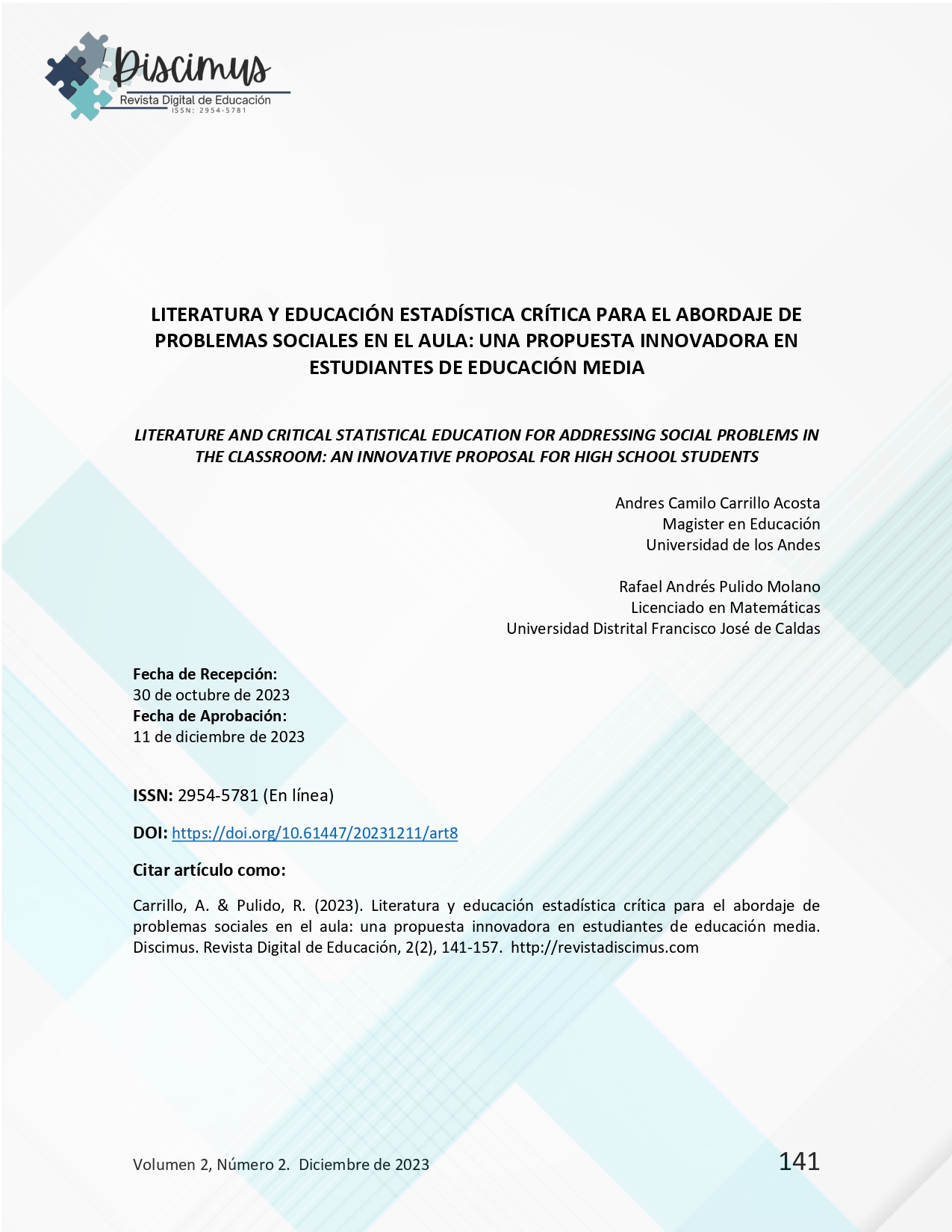Literature and critical statistical education for addressing social problems in the classroom: an innovative proposal for high school students.
DOI:
https://doi.org/10.61447/20231211/art8Keywords:
Critical mathematical education, Statistical education, Mathematics and literature, Competent citizens, Statistical literacyAbstract
This article addresses the importance of critical mathematical and statistical education in the development of competent citizens today. It emphasizes that statistical education involves not only teaching algorithms for data analysis in fictitious data samples but also the development of students' abilities to interpret and question the data presented in society. The main tool used is literary resources as the primary source of data and the context for the studies conducted.
The study's primary tool is the book "Por qué los matan” by Ariel Ávila, aimed at 11th-grade students in Bogotá, Colombia. The book provides a critical and data-based perspective on violence and the murder of social leaders in Colombia, where statistical data are not isolated entities but tools that help understand and address complex issues in society.
Downloads
References
Batanero, C., Díaz, C., Contreras, J., & Arteaga, P. (2011). Enseñanza de la estadística a través de proyectos. Estadística con proyectos, 1-264.
Campos, C., Wodewotzki, M., Jacobini, O., & Lombardo, D. (2010). Statistics education in the context of the critical education: Teaching projects. In Data and context in statistics education
MINISTERIO DE EDUCACION NACIONAL. (2006). Estándares Básicos de Competencias.
Nieves, M. (2022). PROPUESTA DIDÁCTICA PARA LA ENSEÑANZA DE LAS MATEMÁTICAS A TRAVÉS DE EL DIABLO DE LOS NÚMEROS. [Tesis de maestría, Universidad de Salamanca]. Repositorio institucional de la universidad de Salamanca. https://gredos.usal.es/handle/10366/150335
Valero, P. (2006). ¿De carne y hueso? La vida social y política de la competencia matemática. Memorias del Foro Educativo Nacional de Colombia–Competencias matemáticas. Bogotá: MEN.
Ávila, A. (2020). ¿Por qué los matan? Editorial Planeta Colombiana.
Yacuzzi, E. 2005 "El estudio de caso como metodología de investigación: teoría, mecanismos causales, validación",Inomics, 1: 296-306.
Stake, R. E. 2005 Investigación con estudio de casos. Madrid, Morata.

Downloads
Published
Issue
Section
License
Copyright (c) 2024 Andres Camilo Carrillo Acosta, Rafael Andres Pulido Molano (Autor/a)

This work is licensed under a Creative Commons Attribution-NonCommercial-ShareAlike 4.0 International License.
Open Access Policy at Discimus Journal
Discimus Journal is committed to the promotion of free circulation of scientific and academic knowledge, simultaneously ensuring appropriate acknowledgment for our authors while adhering to the ethical principles of scientific publishing. In alignment with this goal, Discimus publishes all its articles under the ATTRIBUTION-NONCOMMERCIAL-SHAREALIKE 4.0 INTERNATIONAL CC BY-NC-SA 4.0
What does this imply for authors, readers, and the scientific community?
1. Usage Freedom: Under the license CC BY-NC-SA 4.0, anyone is allowed to share (copy and redistribute the material in any medium or format) and adapt (remix, transform, and build upon the material) the articles published in Discimus, for any purpose, including commercially.
2. Attribution: Users must give appropriate credit, provide a link to the license, and indicate if changes were made to the original work. This credit must include the author's citation, the article title, the publication in Discimus, and, if feasible, the DOI of the article. This attribution should not in any way suggest that the authors or Discimus endorse the use made of the work.
3. Share Alik: If users remix, transform, or build upon the material, they must distribute their contributions under the identical license as the original.









